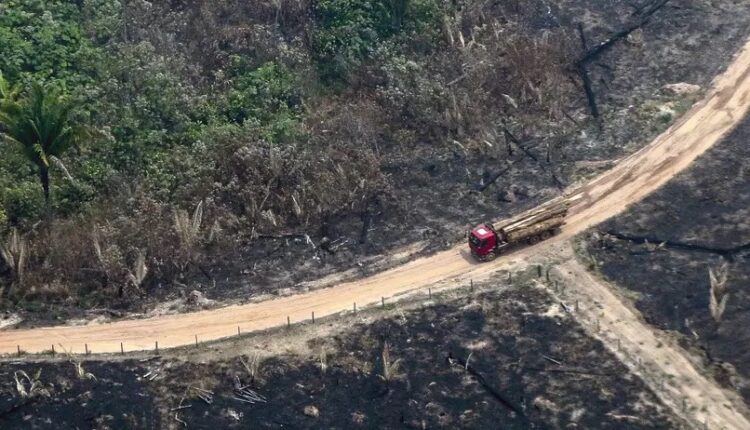
Brazil’s election decisive for indigenous people, environment, climate crisis
Over the past two decades, the expansion of cattle ranching and industrial agriculture in Brazil, especially soybean monocultures, has been devastating. Between 1985 and 2020, the Brazilian Amazon lost around 82 million hectares of natural vegetation, including 53 million hectares of forests. Coincidentally, during this time, agricultural land rose to more than 81 million hectares within the country. In 2020 alone, Brazil lost 2.4 million hectares of savanna, of which 40 percent were in protected areas.
About 45 million hectares of forest have been converted to cattle pasture since the late 1990s. Unsurprisingly, Brazil is one of the largest emitters of greenhouse gases on a per capita basis, with deforestation as a significant contributor, which has resulted in some 34.5 Gt of CO₂ emissions over the past 20 years. The massive use of pesticides has also had a disastrous impact on Brazilian communities—with widespread contamination of soil, water, and livestock—threatening their health and livelihoods. Ever since far-right President Jair Bolsonaro took power in 2019, he has spared no effort to further expand the exploitation of natural resources and encroach further on Indigenous lands. Rich biodiversity ecosystems are being destroyed at a rapid pace to be turned into pastures for an ever-expanding cattle herd or transformed into large crop fields to feed farmed animals.
The expansion of industrial agriculture has involved land grabs and widespread human rights abuses. Killings, violence, and persecutions are constant for those defending land and environmental rights, including Indigenous and Afro-descendant communities. In many cases, police or members of the security forces are implicated in the killings. Amazon Watch has recorded a 150 percent rise in illegal land invasions since Bolsonaro came to power with his pro-business, anti-Indigenous rhetoric. His government has slashed the budget, staffing, and enforcement of the agenciesresponsible for the protection of Indigenous rights (FUNAI), land reform (INCRA), and environmental protection (IBAMA).
In August 2021, a coalition of Indigenous groups accused Bolsonaro’s government of genocide, crimes against humanity, and ecocide before the International Criminal Court (ICC). Their statement before the ICC emphasized “the escalation of invasions in Indigenous Lands, deforestation and fires in Brazilian biomes, as well as in the increase of illegal mining in our territories.”
Bolsonaro has also argued that the current spike in fertilizer prices justifies the continued exploitation of Indigenous territories in the Amazon in order to reduce the country’s dependency on fertilizer imports. The National Fertilizer Plan he has launched aims at expanding the exploitation of minerals to be used for the production of fertilizer.
Furthermore, the expansion of agrofuel crops is irreversibly affecting millions of hectares in Brazil—destroying the livelihoods of rural communities and eroding biodiversity. Brazil’s ethanol is produced almost exclusively from sugarcane, cultivation of which has significantly expanded in recent years—reaching 14 percent of the country’s total cropland (65.4 million hectares).
Industrial farming does not benefit the majority of Brazilians. Beyond the direct impact on Indigenous and farming communities, land is concentrated in the hands of a relatively small number of industrial farms. 90 percent of soy production is controlled by large agribusinesses. Brazilian interests then trade with foreign firms to reach export markets. The growing inequality in access to land is massive: while 2.8 percent of landowners own over 56 percent of all arable land, 50 percent of smallholder farms, which employ about two-thirds of the rural population, have access to only 2.5 percent of the land.
Given Bolsonaro’s complete disregard for Indigenous people, the environment, and the climate, stakes could not be higher for the presidential elections of October 2022. The front runner, Lula da Silva, has a mixed record when it comes to environment and Indigenous rights. Under his two terms as the president, he encouraged the expansion of agrofuels and led the controversial construction of the Belo Monte Dam. However, under his tenure, from 2003 to 2010, Brazil also reduced the deforestation rate in the Amazon by over 70 percent. In his current campaign, Lula has vowed to bolster environmental agencies, rid all Indigenous reserves of illegal mining activities, revoke dozens of Bolsonaro’s decrees, reopen Brazil’s Amazon Fund, and promised “net zero deforestation” in the country within four years.
A reversal of Bolsonaro’s destructive policies is essential to protect Brazil’s rich biodiversity and forests and ensure that the lives and livelihoods of Indigenous Peoples are respected. Beyond Brazil, with the worsening global environmental and climate crisis, voters’ choice could be also a decisive turning point for the rest of the world. The need to drastically shift the way we treat our planet and produce food has never been as dire and perhaps Brazil will show the way.
Frederic Mousseau is Policy Directory of the Oakland Institute and co-author of the report “Walking on the West Side: the World Bank and the IMF in the Ukraine Conflict.” Ana Gaitan-Uribe is a Researcher at the Oakland Institute.
From Common Dreams.


